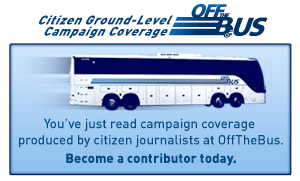
Statewide polls show that voters are split dead-even on Proposition 8 in California, which attempts to ban gay marriage. The issue has triggered well-organized campaigning from both sides as Election Day nears with intensified visibility in the last week. A "Yes" vote would support a ban against gay marriage. A "No" vote supports gay marriage.
Gay marriage was banned in California after the 2000 election, when more than 60 percent of voters passed Proposition 22. In May of this year, however, the California Supreme Court deemed that statute was in violation of the equal protection clause of the state constitution, making it legal for same-sex couples to marry. Proposition 8 is an attempt to overturn that court ruling.
In a surprise turnout in what is a heavily Democratic area of the San Francisco Peninsula, anti-gay marriage "Yes on 8" volunteers dressed in yellow t-shirts waved signs Saturday, covering intersections from Daly City to San Jose -- a forty mile stretch. Many of them stood along one of the main thoroughfares, El Camino Real, urging drivers passing by to support the ban.
Toli Fa, the public affairs director for the Yes on 8 "protect marriage" campaign in San Mateo County, said that the movement started several months ago with evangelical leaders meeting on a regular basis. Included in the group of supporters are churches of many denominations, but Fa said that The Church of Jesus Christ of Latter-Day Saints provided a bulk of the funding for the statewide campaign.
In talking about how the permission of gay marriages would affect her, Fa said, "I'm not going to be called a bride anymore. Only Party A or Party B." Fa was less concerned with the rights of gay people who wished to get married. "Everybody has their rights," she said, brushing off the idea. "But they're trying to change it for the rest of us."
Most volunteers on the street came as part of church groups. One volunteer holding a poster admitted she came because of her church but that she didn't know much about the proposition. As a driver was pulling his vehicle out of a gas station driveway nearby, he shouted out the window for clarification: "If you're against gay marriage, which way do you vote on this one?" The volunteer shrugged and said she didn't know.
She may not be the only one confused, however. Campaign volunteers on both sides have acknowledged that it seems counterintuitive for voters to say "yes" when they oppose gay marriage and "no" if they support it.
"It's so interesting that people feel this is an attack on marriage," said Don Diltz, chairperson of the Peninsula No on 8 Campaign. "I think it supports marriage... if you don't believe in marriage for same-sex couples, then of course don't participate in one. But you shouldn't single out a class of Californians and treat them differently in the constitution. That is just not fair and not right. It's really against how we treat people in California."
One of the biggest controversies being played out on the airwaves is how this proposition would affect education in public schools. TV ads from the "Yes on 8" campaign tell viewers that children's education would be at stake.
"Our kids will be learning that princes can marry princes," Toli Fa said. Referring to Massachusetts, where gay marriage is legal, Fa said that parents there have lost control of what their children were being taught. See the "Yes on 8" ad:
"No on 8" ads counter that argument by having the California superintendent of schools say that is not the case. David Pine, a school board member of the San Mateo Union High School District, said that the educational code instructs teachers to mention marriage as part of the health course, and that there should be "some instruction on the benefits of marriage in supporting a strong family." The educational code permits parents to exclude their children from these family health lessons if they choose so. This is the "No on 8" counter-ad:
The strong showing of yellow-clad "Yes on 8" volunteers lined along El Camino prompted some opponents of Prop. 8 to immediately pick up some "No on 8" signs from the San Mateo County Democratic Headquarters and hold them on the street as well. "The Yes on 8 signs make you realize we're going to have to work really hard," said Pine.
Although Pine is convinced that San Mateo County will vote against Prop. 8, he said that he's not so sure about other areas of California, like the Central Valley. No on 8 campaign volunteers have met several times in the last week for phone banking sessions, and for a rally outside the Redwood City courthouse. Support for the "No" cause has come from various sources, including donations from PG&E, Apple Inc., Google, ACLU and several churches that are open to same-sex marriage.
In addition to moral disagreements, the two campaigns differ on who should have the authority to make the final decision on this issue. Toli Fa and supporters of the proposition are frustrated at the ability of a select number of judges to overturn the vote from 2000. "What happened to the voice of the people -- to have four judges turn that over? That's not their job," Fa said.
David Pine would argue that it is their job. "The justice system deemed [same-sex marriage] a constitutional right. What right do we have to overturn it?" Pine said.
On Election Day, Californians will vote for the second time on whether same-sex marriage should be banned. If voters and judges can continue to overturn each other's decisions -- and if the tight polls are any indication -- this moral battle can extend far beyond Nov. 4.
